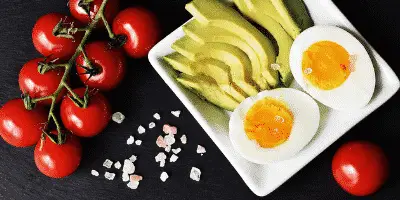One of the key components of the keto diet is an extremely limited carb intake. When a large portion of your diet is carbohydrates, your body burns glucose for energy which inhibits fat loss. Conversely, when you greatly reduce your carbohydrate intake, your body burns fat for fuel and your liver creates ketones, which are water soluble fats that burn a lot more efficiently than carbs.
However, when you’re following the keto diet it’s important to remember that you will be reducing your net carb gram intake. Because of this, you’ll need to understand how to actually count net carbs.
First, net carbs are simply the grams of total carbohydrates in a portion of food minus its grams of fiber.
How to Count Net Carbs on the Keto Diet
Total Carbohydrates
– Dietary Fiber
– Sugar alcohol
= Net carbs
Often, the food label will break down carbohydrates into total carbohydrates, fiber, and sugars.
Total carbohydrates:
Combines all of the carbs and include fiber, sugars, starches, sugar alcohols and glycerin. The label will show the amount found per serving and is measured in grams. They are found in starches, vegetables, fruits, sweets, and milk.
Dietary fiber:
The amount of indigestible or partially digestible bulk from plant foods like fruits, vegetables, whole grains, oats, nuts and seeds and is measured in grams.
Sugar alcohols:
Most often found in foods labeled “sugar-free,” including candy, cookies, chewing gums, and soda, but have recently become popular in packaged health foods.
Sugar alcohol gets its name from its molecular structure, which is a hybrid between a sugar molecule and an alcohol molecule. Biochemically speaking, sugar alcohols are structurally similar to sugar but are either poorly digested or poorly metabolized.
Sugar alcohol has grown in popularity as a sugar replacement in foods because they contain few calories, have a minimal impact on insulin levels, and are safe for those with diabetes.
Why Don’t We Count Fiber?
Even though fiber is a carbohydrate, we don’t count it when we’re calculating net carbs. That’s because fiber is a carbohydrate that your body cannot digest. Instead, it passes through the body undigested, and does not raise your blood sugar levels or trigger an insulin response.
Foods that are low in net carbs, which include nutrient-dense vegetables and fruits, are less likely to interfere with weight loss and do not have a significant impact on blood sugar.
Here are a few zero- and low-carb foods to help you get started on understanding why they are often listed as acceptable foods in low-carb diets:
Examples of Zero Carb Foods
- Beef
- Lamb
- Chicken
- Pork
- Bacon (but avoid the bacon cured in sugar)
- Salmon
- Trout

Examples of Low Carb Vegetables
- Broccoli – 6 grams per cup or 7 grams per 100 grams.
- Tomatoes – 7 grams in a large tomato, or 4 grams per 100 grams.
- Onions – 11 grams per cup or 9 grams per 100 grams.
- Brussels Sprouts – 6 grams per half cup, or 7 grams per 100 grams.
- Cauliflower – 5 grams per cup and 5 grams per 100 grams.
- Kale – 7 grams per cup or 10 grams per 100 grams.
- Cucumber – 2 grams per half cup or 4 grams per 100 grams.
Examples of Low Carb Fruits
(Be careful, as you can see fruits are higher in carbs than vegetables due to their sugar content.)
- Strawberries – 11 grams per cup or 8 grams per 100 grams.
- Apricots – 8 grams in 2 apricots, or 11 grams per 100 grams.
- Avocado – 13 grams per cup or 8.5 grams per 100 grams.
- Grapefruit – 13 grams in a half grapefruit, or 11 grams per 100 grams.
 Reading Food Labels on the Keto Diet
Reading Food Labels on the Keto Diet
You can calculate for yourself, the approximate number of net carb grams in a low-carb product.
First look at the information on the food label and take note of the total carbohydrates, dietary fiber, and sugar alcohol. Then use the following formula to calculate net carbs:
Popular Sugar Alcohols
Here’s a list of some popular sugar alcohols so you can identify them when you look at a nutrition label:
- Erythritol
- Maltitol
- Hydrogenated starch hydrolysates
- Isomalt
- Lactitol
- Mannitol
- Sorbitol
- Xylitol
It may be confusing at first, when trying to calculate net carbs on your own, but now that you have the basic information you know exactly what to do.
Just remember the formula:
Total Carbohydrates
– Dietary Fiber
– Sugar alcohol
= Net carbs
If you can do basic math, you can calculate net carbs!

Related Keto articles:
- Keto Fat Bombs For Your Sweet Tooth
- Keto Cocktail Recipes – Stay On Keto While Drinking!
- What are the Best Things to Eat on Keto?
- Keto Chicken Recipes – Only The Best Ones
- Curious about the Health Benefits of the Keto Diet?
- What Can You Eat on the Keto Diet? (With a Keto Diet Food List)
- Keto Desserts: Tasty Dessert Recipes
- A Keto Diet Food List – What to Eat on Keto Diet
- Keto Recipes for Thanksgiving Dinner



for sweeter I have been using Organic coconut palm sugar . Its 15 calories , 0 sat fat, 0 sodium 4 g sugar 4 g of carbs. I use 1 teap in my tea. I can not stand the taste of the other ones. Do you think I am ok to use this??
Personally, I think it’s fine to use 1 tsp of palm sugar in your tea everyday. Overconsumption is the problem, but 1 tsp per day is pretty small 🙂